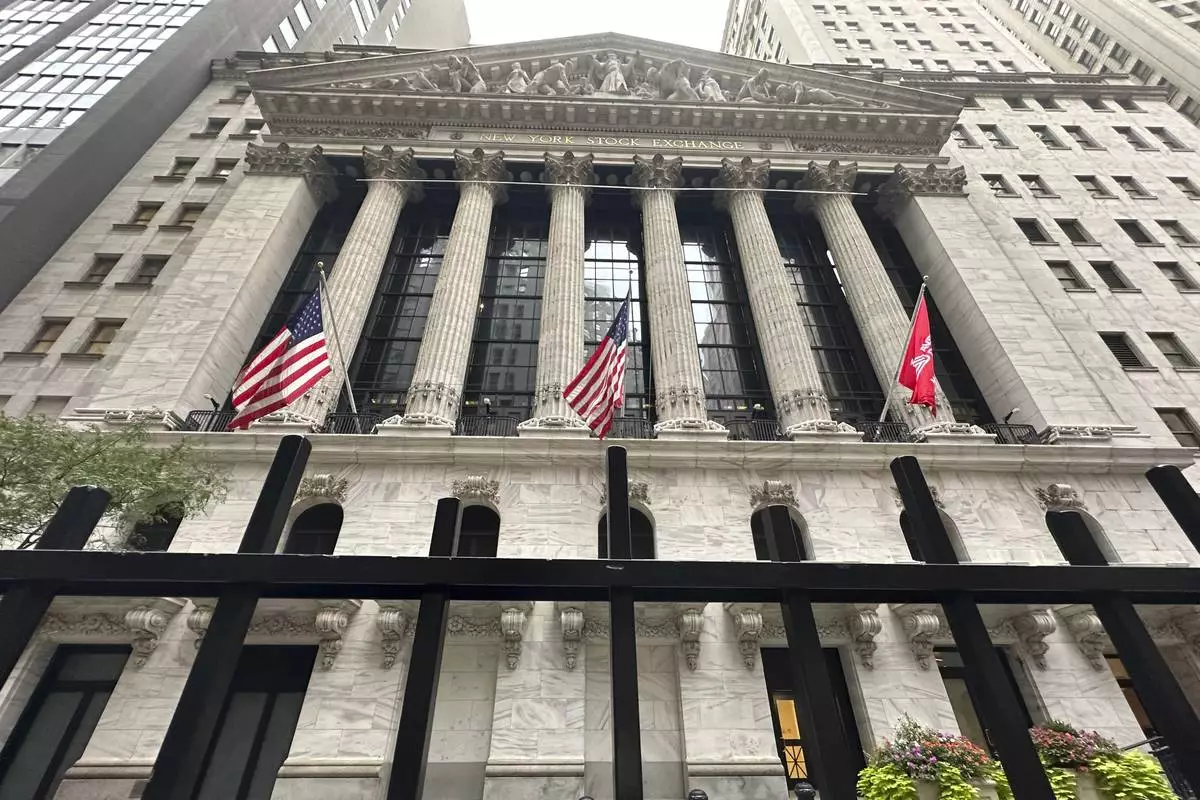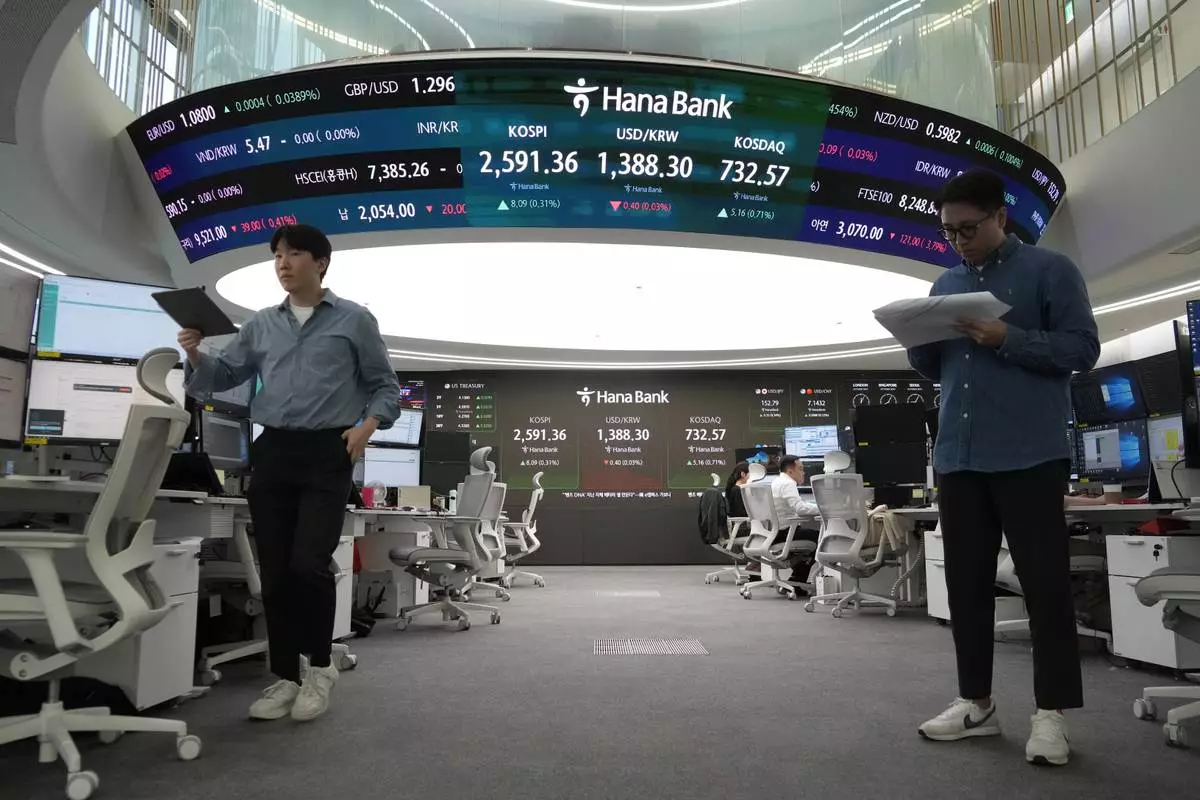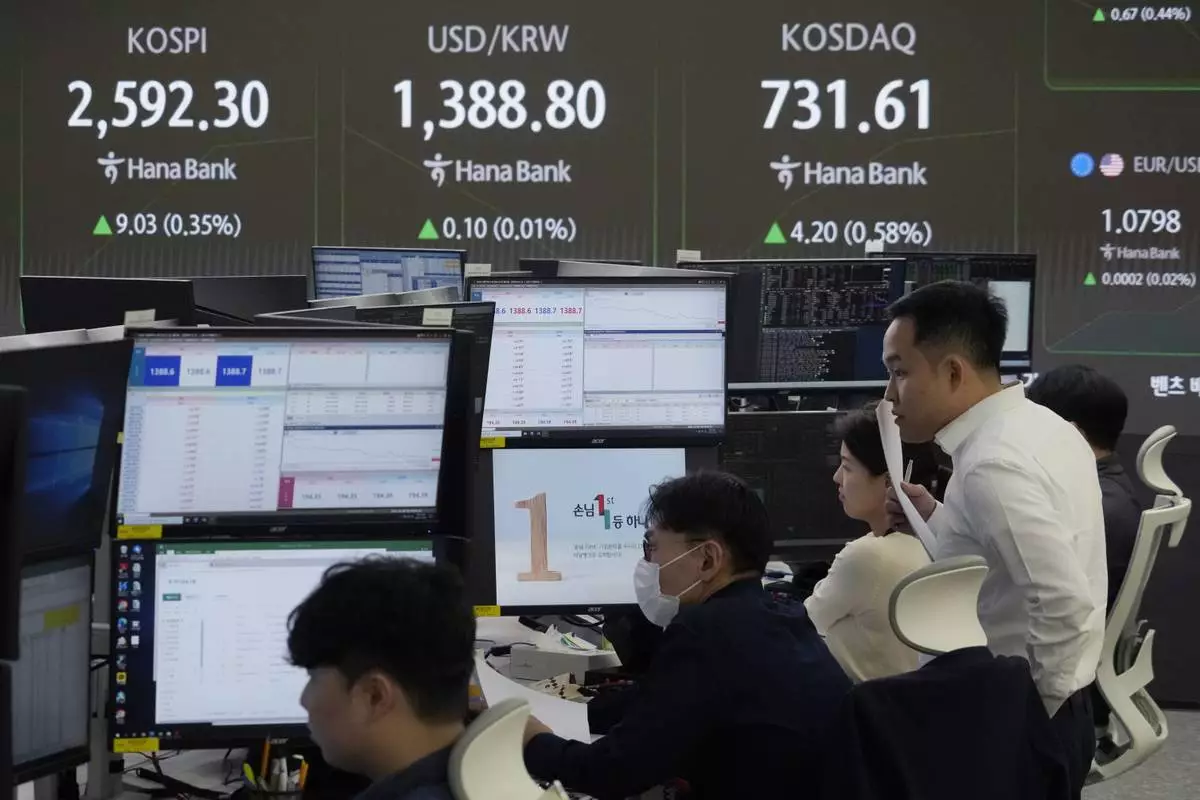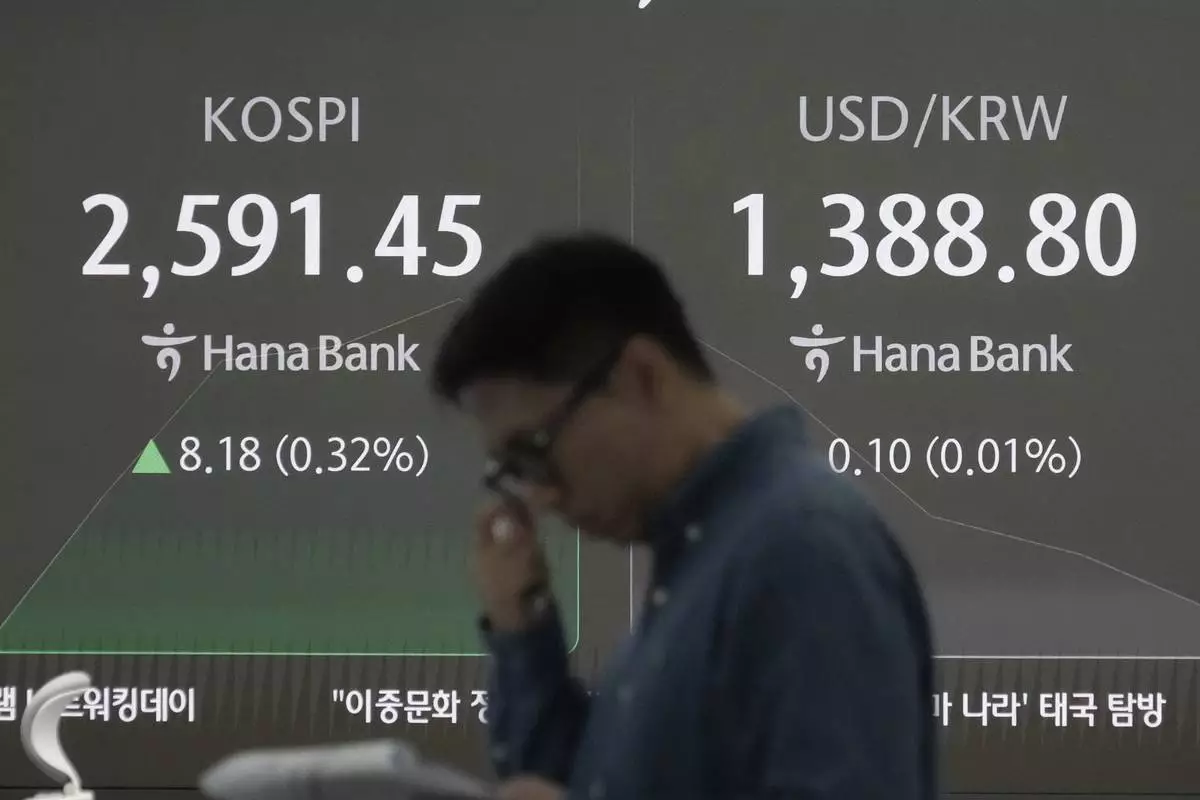DUBAI, United Arab Emirates (AP) — Iranian-German prisoner Jamshid Sharmahd, who was kidnapped in Dubai in 2020 by Iranian security forces, has been executed in Iran after being convicted on disputed terror charges, the country's judiciary reported Monday.
Sharmahd, 69, was one of several Iranian dissidents abroad in recent years either tricked or kidnapped back to Iran as Tehran began lashing out after the collapse of its 2015 nuclear deal with world powers.
Sharmahd's execution comes just two days after Israel launched a retaliatory strike against Iran amid the ongoing Mideast wars. While not directly linking his execution to the attack, the judiciary accused him of being “under orders from masters in Western intelligence agencies, the United States and the child-killing Zionist regime” when allegedly carrying out attacks in Iran.
The judiciary's Mizan news agency reported his execution took place Monday morning, without offering details. Iran, one of the world's top executioners, typically hangs condemned prisoners before sunrise.
Iran accused Sharmahd, who lived in Glendora, California, of planning a 2008 attack on a mosque that killed 14 people — including five women and a child — and wounded over 200 others, as well as plotting other assaults through the little-known Kingdom Assembly of Iran and its Tondar militant wing.
Iran also accused Sharmahd of “disclosing classified information” on missile sites of Iran's paramilitary Revolutionary Guard during a television program in 2017.
“Without a doubt, the divine promise regarding the supporters of terrorism will be fulfilled, and this is a definite promise,” the judiciary said in announcing his execution. Sharmahd was sentenced to death in 2023.
His family disputed the allegations and had worked for years to see him freed. They could not be immediately reached for comment.
Masih Alinejad, an Iranian-American activist who U.S. prosecutors say Iran has tried to kill in the U.S., praised Sharmahd's daughter Gazelle's activism for her father.
She “stood up against the Islamic Republic’s tyranny, against the U.S. and Germany’s appeasement, against the silence and indifference of the world.” Alinejad wrote on the social platform X.
“The Islamic Republic understands no language of peace or diplomacy," Alinejad continued. “Their language is that of hostage-taking, execution, assassination and murder.”
Germany expelled two Iranian diplomats in 2023 over Sharmahd's death sentence. The U.S. State Department has referred to Iran's treatment of Sharmahd as “reprehensible” and described him as facing a “sham trial.”
"We have long made clear that we oppose the way Iran carries out executions, often in a way that fundamentally violates human rights,” State Department spokesman Matthew Miller said Monday.
The German government did not immediately respond to a request for comment Monday.
Amnesty International said the proceedings against Sharmahd had been a “grossly unfair trial” because he had been denied access to an independent lawyer and “the right to defend himself.”
“The government-appointed lawyer said that without payment of $250,000 from the family, he would not defend Jamshid Sharmahd in court and would only 'sit there,'” Amnesty said in one report on his case.
However, Amnesty noted that Sharmahd ran a website for the Kingdom Assembly of Iran and its Tondar militant wing that included claims of "responsibility for explosions inside Iran,” though he repeatedly denied being involved in the attacks.
Sharmahd had been targeted by Iran prior to his kidnapping. A 2010 U.S. diplomatic cable released by WikiLeaks identified Sharmahd as having been targeted by Iran in California, with an operative trying to hire a hitman to kill him.
“It marks a clear escalation in the regime’s attempts to intimidate critics outside its borders, and could have a chilling effect on journalists, academics and others in the West who until recently felt little physical threat from the regime,” the cable read.
Sharmahd had been in Dubai in 2020, trying to travel to India for a business deal involving his software company. He hoped to get a connecting flight despite the ongoing coronavirus pandemic disrupting global travel at the time.
Sharmahd’s family received the last message from him on July 28, 2020. It’s unclear how the abduction happened. But tracking data showed Sharmahd’s mobile phone traveled south from Dubai to the city of Al Ain on July 29, crossing the border into Oman. On July 30, tracking data showed the mobile phone traveled to the Omani port city of Sohar, where the signal stopped.
Two days later, Iran announced it had captured Sharmahd in a “complex operation.” The Intelligence Ministry published a photograph of him blindfolded. A 2022 finding by the United Nations expert found that Sharmahd's detention by Iran was “arbitrary” and asked Tehran to immediately release him.
Sharmahd is the latest dissident put to death by Iran after being brought back to the country.
In 2020, Iran executed Ruhollah Zam, an exiled journalist over his online work that helped inspire nationwide economic protests in 2017, after tricking him into traveling to Iran. In 2023, Iran executed Iranian-Swedish dual national Farajollah Cha’ab, who had been accused of masterminding a 2018 attack on a military parade that killed at least 25 people and who also had been seized abroad in Turkey.
Associated Press writer Matthew Lee in Washington contributed to this report.

FILE - Iranian-German national and U.S. resident Jamshid Sharmahd attends his trial at the Revolutionary Court, in Tehran, Iran, Sunday, Feb. 6, 2022. (Koosha Mahshid Falahi/Mizan News Agency via AP, File
NEW YORK (AP) — U.S. stocks are approaching records Monday ahead of a big week for profit reports from Big Tech stocks. Oil prices, meanwhile, are tumbling toward their worst loss in more than a year.
The S&P 500 was 0.4% higher in afternoon trading. The main measure of the U.S. stock market is coming off its first losing week in the last seven, but it’s still near its all-time high set earlier this month.
The Dow Jones Industrial Average was up 293 points, or 0.7%, as of 2:36 p.m. Eastern time, while the Nasdaq composite was 0.4% higher and flirting with its own record set in July.
Several Big Tech stocks helped lead the way, and five of the behemoths known as the “Magnificent Seven” are on this week’s schedule to report their latest profits. These high-flying stocks have been at the forefront of Wall Street for years and have grown so big that their movements can singlehandedly shift the S&P 500.
After suffering a summertime swoon on worries that their stock prices had risen too quickly when compared with their profits, Alphabet, Meta Platforms, Microsoft, Apple and Amazon are under pressure to deliver more big growth.
Another member of the Magnificent Seven, Tesla, soared to one of the best days in its history last week after reporting a better profit than analysts expected.
Monday’s gains for Big Tech helped offset drops for stocks in the oil-and-gas industry, which were hurt by the sinking price of oil. Exxon Mobil’s 0.6% drop and ConocoPhillips’ slide of 1.5% were two of the heaviest weights on the S&P 500.
A barrel of benchmark U.S. crude fell 6.1%, and Brent crude, the international standard, slid 5.9%. It was the first trading for them since Israel attacked Iranian military targets on Saturday, in retaliation for an earlier barrage of ballistic missiles. Israel’s attack was more restrained than some investors had feared it could be, and it raised hopes that a worst-case scenario may be avoided.
Beyond the violence that is taking a human toll, the worry in financial markets is that an escalating war in the Middle East could cut off the flow of crude from Iran, which is a major oil producer. Such worries had sent the price of Brent crude up to nearly $81 per barrel in early October, despite signals that plenty of oil is available for the global economy. It’s since fallen back below $72.
Financial markets are also dealing with the volatility that typically surrounds a U.S. presidential election, with Election Day fast approaching in two Tuesdays. Markets have historically been shaky heading into an election, only to calm afterward regardless of which party wins.
The trend affects both the stock and the bond markets. In the bond market, Treasury yields were ticking higher to tack more gains onto their sharp rise for the month so far.
The yield on the 10-year Treasury rose to 4.29% from 4.24% late Friday. That's well above the roughly 3.70% level where it was near the start of October.
Yields have climbed as report after report has shown the U.S. economy remains stronger than expected. That’s good news for Wall Street, because it bolsters hopes the economy can escape from the worst inflation in generations without the painful recession that many had worried was inevitable.
But it’s also forcing traders to ratchet back forecasts for how deeply the Federal Reserve will cut interest rates, now that it’s just as focused on keeping the economy humming as getting inflation lower. With bets diminishing on how much the Fed will ultimately cut rates, Treasury yields have also been given back some of their earlier declines.
That means the U.S. jobs report on the schedule for Friday could end up being the market's main event, even bigger than the Big Tech profit reports. Investors want to see more evidence of solid hiring to keep alive the perfect-landing hopes for the economy.
Such data has supplanted inflation reports, which used to be the most important for Wall Street every month but have waned as inflation seems to be heading toward the Fed's target of 2%.
Yields have also climbed as investors have seen former President Donald Trump's chances of re-election improving. Economists say a Trump win could help push inflation higher in the long term, and worsening inflation could push the Fed to hike interest rates.
Trump Media & Technology Group, the company that tends to move more with Trump's re-election odds than on its own profit prospects, jumped 18.9% Monday to $46.27. The parent company of Trump's Truth Social platform has been rallying since hitting a bottom of roughly $12 in late September, though it's still well below its perch above $60 reached in March.
Robinhood Markets rose 3.3% after it said it would begin allowing some of its customers to trade contracts based on whether they think either Trump or Vice President Kamala Harris will win the 2024 election.
Delta Air Lines was another winner and rose 3.1% after suing CrowdStrike, claiming the cybersecurity company had cut corners and caused a worldwide technology outage that led to thousands of canceled flight in July.
In stock markets abroad, Japan’s Nikkei 225 rose 1.8% as the value of the Japanese yen sank after Japanese Prime Minister Shigeru Ishiba’ s ruling coalition lost a majority in the 465-seat lower house in a key parliamentary election Sunday.
Stock indexes were mostly higher across much of the rest of Asia and in Europe.
AP Business Writers Yuri Kageyama and Matt Ott contributed.

FILE - The New York Stock Exchange is shown on Sept. 18, 2024, in New York. (AP Photo/Peter Morgan)

Currency traders work at the foreign exchange dealing room of the KEB Hana Bank headquarters in Seoul, South Korea, Monday, Oct. 28, 2024. (AP Photo/Ahn Young-joon)

Currency traders watch monitors at the foreign exchange dealing room of the KEB Hana Bank headquarters in Seoul, South Korea, Monday, Oct. 28, 2024. (AP Photo/Ahn Young-joon)

A currency trader works near a screen showing the Korea Composite Stock Price Index (KOSPI), left, and the foreign exchange rate between U.S. dollar and South Korean won at the foreign exchange dealing room of the KEB Hana Bank headquarters in Seoul, South Korea, Monday, Oct. 28, 2024. (AP Photo/Ahn Young-joon)














